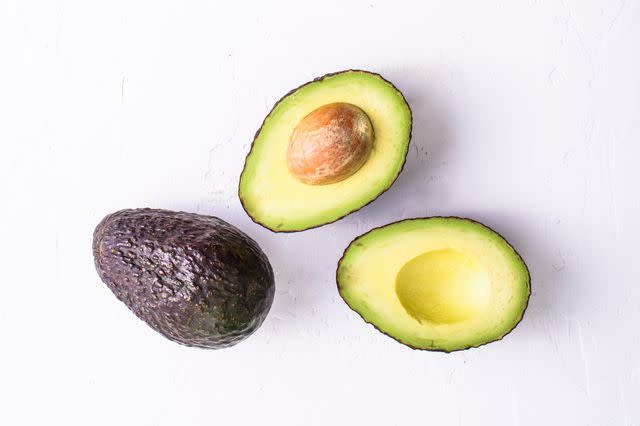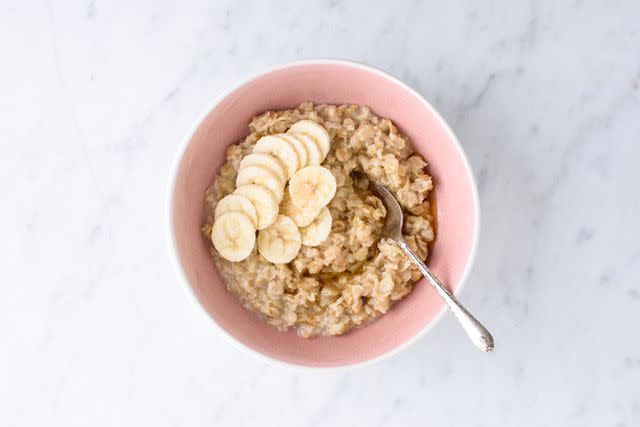7 Foods for Better Heart Health, According to a Dietitian
Certain foods are rich in heart-healthy nutrients.

Medically reviewed by Melissa Rifkin, MS, RD, CDN
Heart health is dependent on a variety of factors, many of which are connected to what you eat. While certain foods may be rich in specific nutrients that can reduce inflammation, decrease your cholesterol, and reduce blood pressure, the fact is, a lifestyle approach is most important for heart health. It's the combination of physical activity, a nutritious and balanced diet, adequate sleep, and stress management, among other considerations.
That said, diet plays a huge role.
What Role Does Nutrition Play in Heart Health?
Nutrition plays a key role in maintaining optimal heart health. Essentially, the food we choose to eat provides the body with the nutrients we need to function. Some foods are better than others, and some foods may actually worsen heart health (i.e. salt, saturated fat, etc.). A balanced, heart-healthy diet that is low in saturated fat, trans fat, cholesterol, and sodium is ideal for promoting heart health. Opt for tons of fruits and vegetables, whole grains, lean protein, and healthy fats to reduce the risk of developing heart disease.
Diets that are high in saturated and trans fats (typically found in highly processed foods) can increase LDL or "bad" cholesterol levels, which over time can promote the buildup of arterial plaque, increasing the risk of heart disease. Choosing an eating pattern with plenty of fruits and vegetables provides fiber and antioxidants, which can reduce inflammation and can lower blood pressure.
Related:What is Nutrition and Why Does it Matter?
7 Foods for Better Heart Health
When it comes to heart health, there are a variety of nutrients that support optimal heart health, including fiber, antioxidants, omega-3 fatty acids, magnesium, potassium, and vitamin D. The great news is: there are a ton of tasty, nutritious foods that are packed with these heart-healthy nutrients. Here are a few evidence-supported foods for better heart health.
Salmon

Salmon is packed with Vitamin D, a key nutrient when it comes to heart health. Vitamin D regulates calcium in the body (which is important for muscle function, especially the heart). It also has an anti-inflammatory effect that prevents the buildup of plaque and an anti-hypertensive effect that may reduce blood pressure levels.
One meta-analysis concludes that a high intake of fish (such as salmon) is associated with a decreased incidence of cardiovascular disease and mortality.
Other vitamin-D-rich foods: flaxseeds, walnuts, chia seeds
Broccoli

When it comes to heart health, broccoli is a powerhouse. The green vegetable is packed with fiber, a key nutrient that has been shown to reduce cholesterol levels and regulate blood sugar levels. Broccoli also contains an anti-inflammatory compound called sulforaphane which may protect against atherosclerosis (or plaque build-up in the arteries).
Other high-fiber foods: beans, berries, avocado
Related:7 Creative Ways to Eat Broccoli
Avocado

Delicious, fiber-filled avocados are rich in polyunsaturated fats, or fats that can help to reduce the levels of "bad" cholesterol. High levels of LDL cholesterol are a risk factor for heart disease, as high levels can lead to a buildup of plaque in the arteries, also known as atherosclerosis. Polyunsaturated fats include omega-3 and omega-6 fatty acids, which are essential to consume in your diet, as the body cannot synthesize them.
Avocado is packed with omega-3s, healthy fats that may help to lower blood pressure, reduce cholesterol levels, and reduce inflammation.
Other omega-3-rich foods: flaxseeds, walnuts, chia seeds
Other omega-6-rich foods: nuts, seeds, eggs
Related:8 Creative Ways to Eat Avocado
Whole Oats

Whole grains, like oats, are synonymous with heart health. The powerful grains are a good source of soluble fiber, which forms a gel-like substance in the body and binds to cholesterol, preventing it from being absorbed into the blood. They're also rich in antioxidants, which fight against oxidative stress, and magnesium, a mineral that maintains proper muscle function and helps to regulate the rhythm of the heart.
Oats are particularly heart-healthy, as they contain beta-glucan, a proven cholesterol-lowering compound. Be sure to choose whole oats or plain oats over the sweetened, packaged varieties to avoid extra sugar.
Other whole grain foods: whole wheat, buckwheat, barley
Almonds

Almonds are full of heart-healthy antioxidants, healthy fats, and protein. Antioxidants do exactly what their name sounds like: they oppose oxidation which reduces inflammation. Almonds are particularly rich in vitamin E, an antioxidant that reduces inflammation in the body.
A comprehensive review of 64 randomized controlled trials reveals that almonds lower cardiovascular disease risk by reducing blood pressure and improving heart rate variability. Plus, they are also shown to improve gut microflora and promote satiety.
Other antioxidant-rich options: eggs, yogurt, lean meat
Leafy Greens

Verywell / Alexandra Shytsman
Leafy greens, such as collard greens, kale, spinach, and bok choy are rich in magnesium. This essential mineral plays a huge role in heart health. Magnesium helps regulate heart rhythm, relax blood vessels, reduce inflammation, prevent atherosclerosis, and reduce overall stress. Leafy greens are also chock full of heart-healthy fiber and antioxidants.
Other magnesium-rich options: eggs, yogurt, lean meat
Blueberries

Blueberries are packed with anthocyanins, a type of polyphenol that give the fruit its deep blue color. Anthocyanins are strong antioxidants that help to reduce inflammation and oxidative stress in the body.
Some evidence shows that consuming blueberries improve several risk factors for reducing cardiovascular disease, such as reducing blood pressure, improving cholesterol profiles, and enhancing endothelial function.
Other polyphenol-rich options: cocoa, spices, olives
How to Incorporate Heart-Healthy Foods Into Your Diet
These foods are easy to incorporate into your everyday meals and snacks. If you need some inspiration, here are a few of our top tips:
Make a grain bowl. Create an easy, satisfying, and tasty meal by simply starting with a portion of a cooked whole grain (bulgar, brown rice, or barley, etc.), top with veggies such as mixed greens or roasted carrots, add a protein (if you want), and flavor with a bit of salad dressing, chopped nuts, and avocado.
Build a heart-healthy sandwich. Swap deli meat for grilled chicken or a lean, low-sodium option. Pile on the veggies and swap mashed avocado for mayo.
Optimize your oatmeal. Top your heart-healthy oats with blueberries and chia seeds to boost your intake of fiber, antioxidants, and omega-3s.
Snack smarter. Many nut mixes add salt, which can cause you to hit your daily sodium requirements quickly. Swap salted nuts for unsalted roasted almonds. Take it up a notch by making your own trail mix by combining unsalted almonds, walnuts, raisins, and dried unsweetened blueberries.
If you need individualized meal ideas or support, consider consulting a physician or registered dietitian nutritionist to get a personalized recommendation. Note that some of these foods may be expensive. Consider investing in canned or frozen options if a portion of fresh food is not within your budget, or aim to incorporate alternative budget-friendly foods that contain these heart-healthy nutrients.
Limit sodium intake. Keep under the daily recommended amount of 2,300 milligrams of sodium per day.
Watch your portion sizes.
Check ingredients on canned items. Skip canned fruit with lots of added sugar or heavy syrups.
Limit your intake of trans and saturated fats.
Opt for leaner proteins. Skip higher-fat or more processed meats, such as organ meats, hot dogs, bacon, and fried meats.
Prioritize exercise, if possible.
Related:7-Day Meal Plan & Recipe Prep to Lower Cholesterol
The Bottom Line
In general, all foods fit into a healthy, balanced diet, unless you have specific limitations or allergies. That said, there are some types of food and cooking methods that may not be beneficial for your heart.
Read Next:10 Diet and Lifestyle Changes to Boost Heart Health

